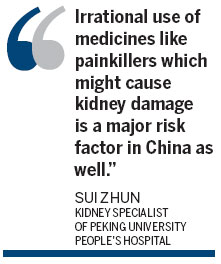Awareness of chronic kidney disease remains low
Updated: 2013-03-20 07:32
By Shan Juan (China Daily)
|
||||||||
More than one out of 10 Chinese adults suffer from chronic kidney disease, but the awareness level remains poor, experts warn.
Wang Mei, chief of the renal division of the Peking University People's Hospital, made the remarks at an awareness raising event, one day before World Kidney Day, which fell on March 14 this year.
CKD is a progressive loss in renal function over months or years. Symptoms of worsening kidney function are non-specific at first.
In China, of all CKD cases, 1 to 3 percent will develop end-stage renal disease, also known as uraemia, which needs either dialysis or a kidney transplant as the only treatment, Wang says.
The annual medical expenditure for dialysis alone is 80 billion yuan ($13 billion) on the mainland, roughly four times China's entire government health budget in 2012, reports show.
"The chronic disease has become a public health challenge in China and the world," Wang says.
She calls on enhanced public awareness campaigns to educate people on CKD risk factors and prevention tips as currently only 12.3 percent of Chinese people know about the condition.

Sui Zhun, a leading kidney specialist of the hospital, says old people suffering chronic conditions like hypertension, diabetes, and cardiovascular (heart-related) and cerebrovascular (brain-related) diseases, are most susceptible to CKD.
In addition, "irrational use of medicines like painkillers which might cause kidney damage is a major risk factor in China as well," he says.
In China, glomerulonephritis (inflammatory disease of both kidneys) remains the top cause of CKD but diabetes is growing fast as a major cause, Wang says.
She adds that in many developed countries like the United States, diabetes has long been the number one CKD cause.
In view of that, Wang calls on the Chinese public to keep a healthy lifestyle including a balanced diet low in salt, no smoking, and exercise frequently.
For early detection, high-risk groups should go through screenings at least once a year, she recommends.
Simple urine tests could show the result in several minutes and are widely available at even grassroots-level community clinics.
Those suffering symptoms like fatigue, dropsy, vomiting and frequent urination at night should consult a specialist for possible CKD, Sui adds.
"Early diagnosis leads to early treatment and will slow down or halt the disease from progressing to end stage," he says.
But he also concedes that currently, grassroots-level physicians' capacity in CKD intervention and treatment remains relatively low.
CKD patients face greater risk of cardiovascular disease and high blood fats. Therefore, timely and proper intervention of these conditions matters as well.
"A comprehensive approach in CKD treatment is crucial," Wang says.
For end-stage patients, renal replacement therapy is required to save lives.
Wang says many patients tend to delay treatment resulting in the development of life-threatening complications.
She urges patients to follow their doctor's advice and initiate timely treatment.
shanjuan@chinadaily.com.cn
(China Daily 03/20/2013 page19)

 In Photos: 7.0-magnitude quake hits Sichuan
In Photos: 7.0-magnitude quake hits Sichuan
 Li Na on Time cover, makes influential 100 list
Li Na on Time cover, makes influential 100 list
 FBI releases photos of 2 Boston bombings suspects
FBI releases photos of 2 Boston bombings suspects
 World's wackiest hairstyles
World's wackiest hairstyles
 Sandstorms strike Northwest China
Sandstorms strike Northwest China
 Never-seen photos of Madonna on display
Never-seen photos of Madonna on display
 H7N9 outbreak linked to waterfowl migration
H7N9 outbreak linked to waterfowl migration
 Dozens feared dead in Texas plant blast
Dozens feared dead in Texas plant blast
Most Viewed
Editor's Picks

|

|

|

|

|

|
Today's Top News
Live report: 7.0-magnitude quake hits Sichuan, heavy casualties feared
Boston suspect cornered on boat
Cross-talk artist helps to spread the word
'Green' awareness levels drop in Beijing
Palace Museum spruces up
First couple on Time's list of most influential
H7N9 flu transmission studied
Trading channels 'need to broaden'
US Weekly

|

|







